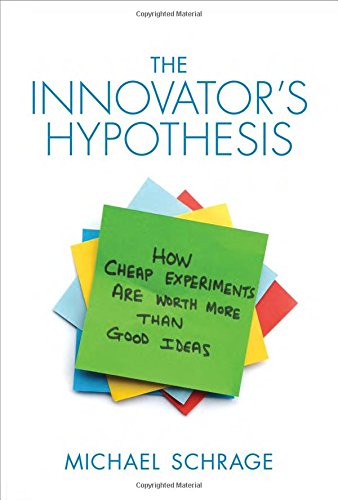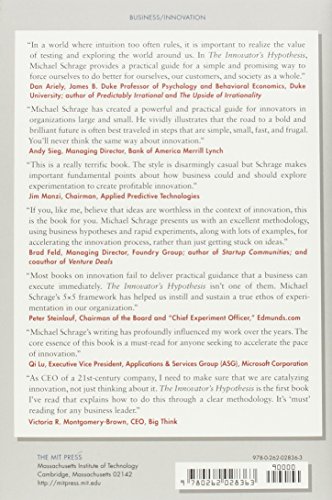


Michael SchrageThe Innovator's Hypothesis: How Cheap Experiments Are Worth More Than Good Ideas
K**.
Interesting read
I found this book to be an interesting read. I have to say I started reading it with some preconceived ideas of why this experimenting would not work. Surprisingly the author addressed those concerns (and some I hadn't even thought of). I wanted to read this more out of intellectual curiosity than as something that I might take a part of. I'm way too far down the corporate ladder for that, but still this might be a book that I can recommend to someone near the top of mine.If I was to make a complaint about this book, it would be toward the first chapter. The author really tries to sell the book to you. Which is sort of annoying given you supposedly have the book and are reading it. Made me flashback to some workshops / presentations I've sat thru in the past - where the presenter spent a good portion to the beginning telling you why you should be there. IMO, if your butt is already in a chair, then you don't need to be sold again. However, once you get past the first chapter the book moves along pretty well. The bulk of this book is a primer, that covers a lot of subjects. My guess the author does that in case someone reading the book is unfamiliar with different aspects of business management. I have to say that is what I found most interesting about this book. The anecdotal stories about different businesses and people that the author used to illustrate his point.So I have to say I enjoyed reading it, I even went ahead and purchased the Kindle edition to keep in my collection.
T**E
Terrific guide to the practice of innovation
One of the biggest innovation challenges that organisations face is making the transition from talking about innovation to actually doing it. This book is a great remedy to that problem. Schrage's last book, Who Do You Want Your Customer to Become? is an under-appreciated gem, and this one is just as good.His solution to the innovation is to try more stuff. And the book outlines a structured approach to doing this. The idea is to get 5 teams of 5 people to build 5 experiments that they can execute in 5 weeks. The numbers don't matter so much - it's the spirit of this approach that is important. The experiences that Schrage recounts here are consistent with mine - once you get people testing ideas, and then making data-driven decisions, your innovation capability improves.There are plenty of books around that make the case for why innovation is important. But this is one of the best for figuring out what you should do once you buy that argument. If your organisation follows the steps in this book, it will become more innovative.
J**Y
Great case for creating a business culture of small experiments.
I read this to learn about how to make use of small experiments to gain insight and find things that could and should be scaled up.It's aimed primarily at large organizations, but I think this approach and mindset would be incredibly valuable for small businesses, non profits and even freelancers. If there's a follow up I'd love to see stories and tips for using this approach within smaller orgs.
W**R
the importance of trying on an idea to see if it fits
An interesting book, I haven't read the first one and perhaps that is why it felt a little like walking in late to a movie WRT The 5x5 concept that is so key to this book.
A**R
Very good..
Very good... a little slow moving in placing and could have been more thorough. But good book, good ideas to implement. Helped a lot
S**A
It is a good read and helpful for managers
I read this on book on my Kindle. The book describes a framework, which draws inspiration from portfolio theory, design theory, statistical experiment design and Agile methodologies, for innovation.It is a good read and helpful for managers, startups and truly for anyone who feels that they are not innovating enough.
A**R
A business book work reading
This is a very well written business book. Mr. Schrage does a lovely job of suggesting how the corporate executive can build or encourage a culture of innovation.I would highly recommend it for anyone seeking to excel as a change agent or growth company executive
S**N
Advocates more empiricism in business
Empiricism and the scientific method have had some positive impact on the practice of business. Most people recognize the market as a great external object of study, yet scientific impact on innovation is usually limited and relegated to the domain of hunches by analytic experts. For their part, business schools tend to crank out expert planners and analysts, but do not expressly delve into experimentation. Schrage thinks that is a mistake and writes this book to plead his case that experiments can drive innovation in the business world, much as it does in the sciences.Empiricism as a practice functions as a core historic precept of the scientific method and continues to transform modern life. It simply means that theories/ideas need to be tested against reality for their truthfulness. Few have problems with this idea, and efforts to enact empiricism often expand into building useful and even revolutionary tools to do reality-checks. Even fields like psychology use this lingo in coaching clients how to approach life. Sometimes, humans believe deeply in their ideas, and experiments do not always prove those ideas to be completely correct.Schrage thinks it’s time that the business world embrace such an ethic of experimentation. He, a PhD economist, tires of seeing businesses hide behind the analysis of MBAs instead of running inexpensive (“cheap”) tests to see if the market can bear such a practice. I am no businessperson, but in my field of software development, we often build slow so that we can quickly correct mistakes without misspending tens of thousands of dollars. Indeed, prototypes to test these reality often become the basis of the next innovation. Though no economic or management expert, it certainly makes good sense to me to expand this practice of hypothesis generation to business planning.Of course, the devil is always in the details. The strength of this ethic lies in coming up with good hypotheses, itself an art-form. Many business schools churn out planners, not thinkers and experimenters. Implementing this ethic may require further education in order for such scientific thinking to become prevalent. I agree wholeheartedly with the sentiment that experiments trump analysis, but analysis is more prevalent because it’s easier. Scientific thinking is harder and more disciplined, but Schrage devotes the concluding chapters of this book to developing how this change can transpire. More thought and explanation could help businesses with this task because the potential is high.
W**I
A very good starter book for Innovation enthusiasts
A very good starter book for Innovation enthusiasts. It starts off a little dry and it takes a while to reach the interesting parts (heavily backed up with great real life examples), but it is absolutely worth it.
A**N
El libro muy bien, pero Correos me ha cobrado 5,18€ porque venía de Reino Unido :(
Compré el libro de 2ª mano por poco más de 6€ y Correos me ha cobrado 5,18€ por "gastos de gestión aduanera", ¡casi lo mismo que lo que costaba el libro!.La cartera me ha dicho que lo están cobrando para envíos de Reino Unido desde el pasado julio.
S**E
Good concept but woeful lack of content to justify a full book
The idea is good but there is only enough content for 50 pages and 4 chapters. The book becomes repetitive beyond a point in time and seriously lacks enough cases beyond Netflix / blockbuster. I would suggest if u read the synopsis and first couple chapters u pretty much got the just.
Trustpilot
5 days ago
1 month ago